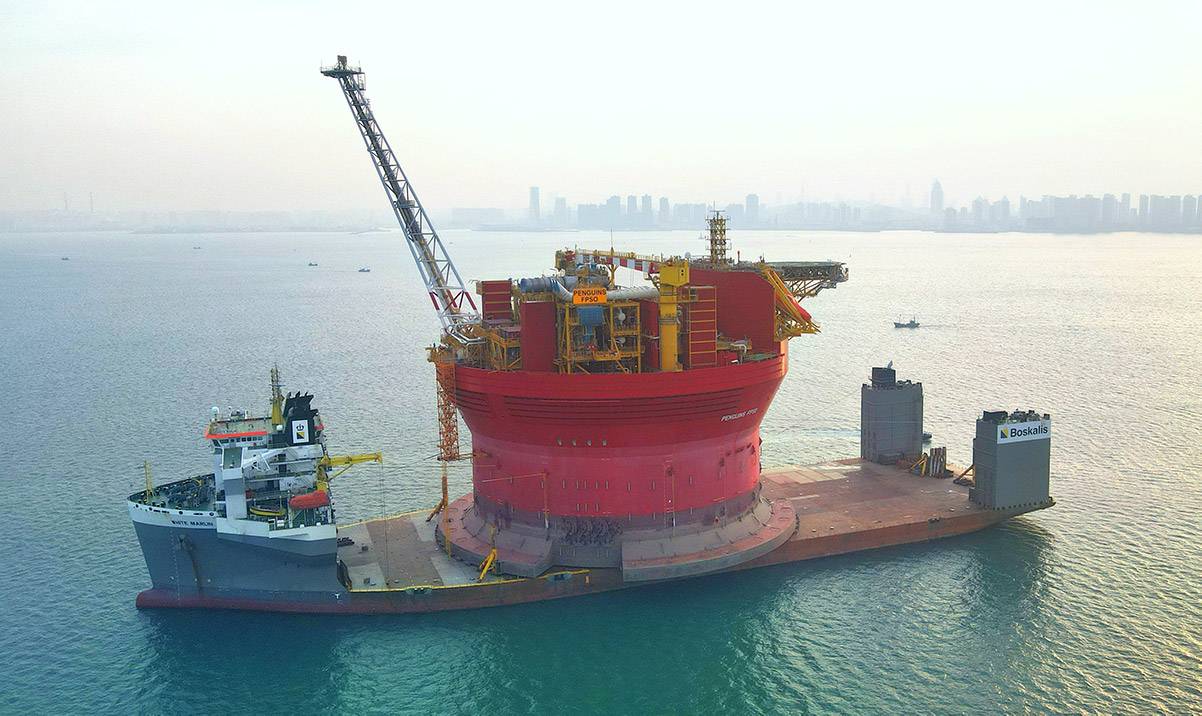Shell’s Penguins FPSO has set sail from China loaded aboard Boskalis’ White Marlin semi-submersible heavy transportation vessel.
In a social media post on Thursday, Boskalis said: “Boskalis’ semi-submersible transport vessel White Marlin departed from Qingdao, China with an impressive cargo; the 34,000-ton cylinder-shaped Shell Penguins FPSO. After a smooth and safe float-on and [seafastening] campaign, the vessel started her journey to Norway.”
At the time of writing, the White Marlin was sailing past the east coast of Taiwan, en route to Singapore, according to MarineTraffic.com information.
The cylindrical FPSO, designed by Sevan Marine, was ordered by Shell from Fluor in 2018.
Following a stop in Norway, the FPSO will then be moved to the area northeast of the Shetland Islands and be used for the Penguins offshore field redevelopment.
Chinese Offshore Oil Engineering Co., Ltd. company in Qingdao, built the cylindrical FPSO, which is 118 meters tall.
In January 2018, Shell made a decision to redevelop the Penguins field in the northern North Sea, authorizing the start of the FPSO construction.
The company said at the time that the FPSO would have a peak production of around 45,000 boe/d.
The redevelopment of the field, connected to the Brent Charlie platform, is required as the Brent Charlie platform is planned to be decommissioned.
Shell said in 2018 that the Penguins redevelopment would see an additional eight wells drilled, which will be tied back to the new FPSO vessel, with a storage capacity of 400000 barrels.
Natural gas will be exported through the tie-in of existing subsea facilities and additional pipeline infrastructure.
The Penguins field is in 165 meters (541 feet) of water, approximately 150 miles northeast of the Shetland Islands. Discovered in 1974, the field was first developed in 2002.
Shell and its partner Exxon in 2018 opted for the cylindrical Sevan 400 FPSO design. Oil will be transported via tanker to refineries, and gas will be transported via the FLAGS pipeline to the St Fergus gas terminal in north-east Scotland. The FPSO is designed to operate continuously for 20 years without dry docking.
Good news for Magnora
The launch of the FPSO is good news for the Oslo-listed company Magnora, too.
Magnora, formerly known as Sevan Marine, was formed in 2018 following Sembcorp Marine’s acquisition of all of Sevan Marine’s intellectual property and proprietary business, and 95% of shares of HiLoad LNG AS for $39 million.
Sevan Marine was famous for the cylindrical rig and FPSO designs it provided for the offshore oil and gas industry.
Magnora, an “heir” of Sevan Marine, inherited Sevan Marine’s revenue-sharing deals related to two UK North Sea field developments using its cylindrical FPSO design, Dana Petroleum’s Western Isles, and Shell’s Penguins field.
In a statement this week, Magnora said the remaining payments from the “Penguins” license contract was $16.12 million in total and would be paid over three separate milestones to Magnora ASA.
“We are pleased to announce that the first milestone that occurs upon “Exit Shipyard” has been met and that $7.5 will be paid to Magnora shortly,” Magnora said earlier this week.
The remaining milestones are upon first oil which triggers a payment of $4.3125 million and upon a reached production target of 4m barrels of oil which triggers another $4.3125 million.
While receiving cash from what it calls a ‘legacy’ oil business Magnora is these days focused on the renewables.
Torstein Sanness, Executive Chairman of Magnora ASA said: “We are pleased that this important milestone (“Exit Shipyard”) has been reached for our important legacy contract. Furthermore, our new business within renewables have achieved great success within the project development market. So far, Magnora has developed a portfolio of above 3.300 MW of renewable projects across solar, battery storage, wind, and offshore wind in the Nordics, UK and South Africa.
“Our solar project business has already contributed to our business with its first dividend to Magnora in Q3 this year less than 18 months after our first investment. Magnora is actively exploring and developing for a profitable a green, sustainable, low-emission future.”




